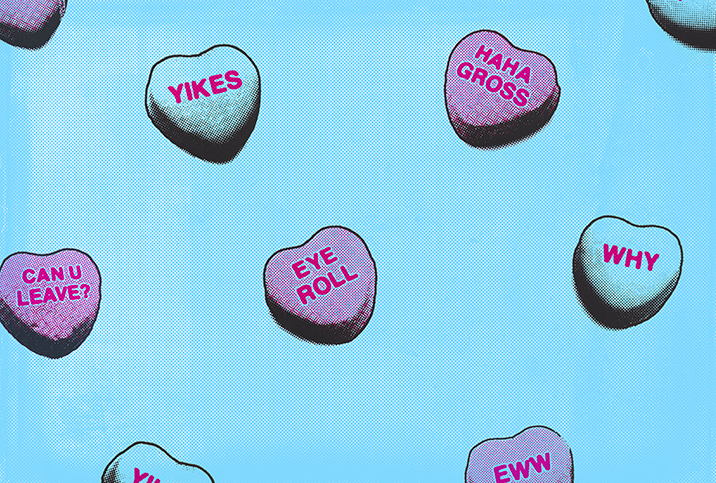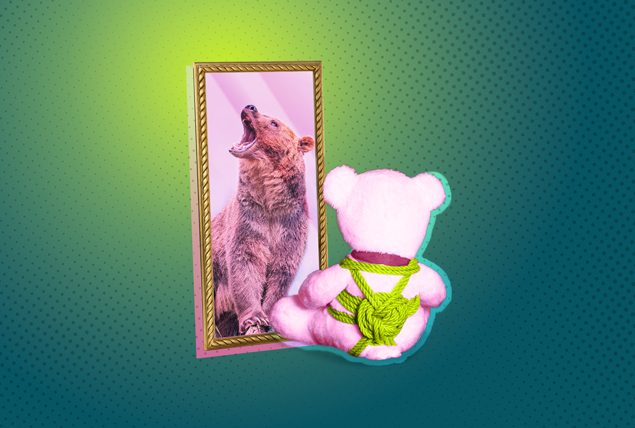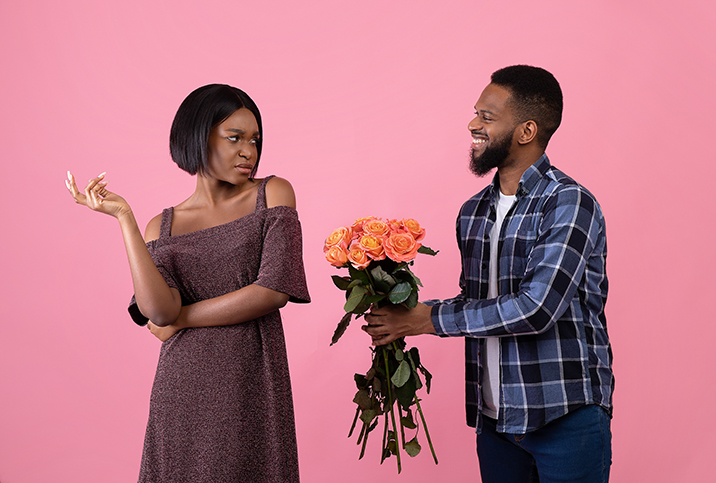What Is Rejection Therapy?

"Today I'm starting something that really scares me and that's rejection therapy," Halle Buttafuso told her more than 60,000 TikTok followers, with a slight quaver in her voice while applying make-up.
Buttafuso went on to explain how the goal of rejection therapy is to do a different task each day for 100 days with the intention of getting rejected.
Buttafuso also revealed to her viewers, that through therapy, she learned she has "a deep fear of rejection" and judgment, and rejection therapy's tasks are "all of my worst fears combined."
Why, you might be forgiven for asking yourself, is Buttafuso doing this to herself? Does rejection therapy actually work, and can it help you be more confident when dating?
What is rejection therapy?
Rejection therapy originated as a self-help game created by Jason Comely, an IT professional in Ontario, Canada. It has been compared to exposure therapy, a mental health treatment to help people confront their fears and overcome anxiety.
"While not a real treatment, the hashtag for #rejectiontherapy garnered millions of views thanks to entrepreneur Jia Jiang's Rejection Therapy website," said Helena Roman, a relationship coach and strategist near Boston.
Jia Jiang declined to be interviewed for this story.
"At its core, rejection therapy involves you overcoming fears associated with being turned down and encourages you to not be deterred from situations simply because there is a chance of rejection," added Maria Sullivan, a New York City-based dating expert and the vice president of Dating.com.
But does it work?
Buttafuso has been chronicling her 100 days of rejection therapy on TikTok. Watching her videos, you can see her confidence has grown, which has further allowed her personality to shine.
"Since starting this challenge, I've noticed myself become more curious about the world around me. I've been able to do things that I never even thought were possible," said Buttafuso, a TikTok creator based in the Virginia Beach area. "Now that I've gained confidence in asking questions that could get me rejected, I've become more willing to step out of my comfort zone and ask for things in my day-to-day life."
Her mindset and outlook on rejection have changed. She said she's more optimistic, less anxious and more confident in what she can accomplish.
New York City-based lifestyle freelancer Mia Sherin tried rejection therapy for an Elite Daily article and said she observed major changes in her life only a month later.
"I think rejection therapy boosted my confidence simply because I felt so awesome for managing to do all of these bold—and ridiculous—things," Sherin explained. "My experiment taught me that rejection isn't so scary after all, and that's what gave me the confidence to put myself out there, knowing my feelings could get hurt, while also knowing that it was worth the risk."
Rejection therapy can help in today's dating app world
"Rejection therapy is having a moment right now because of the current dating app culture," said Jaime Bronstein, a licensed relationship therapist and the author of "MAN*ifesting: A Step-By-Step Guide to Attracting the Love That's Meant for You." "If you don't develop a thick skin regarding dating apps, it can be detrimental to one's mental health.
"The dating apps bring an atmosphere of abundance and with that comes [feelings of being disposable]. People aren't giving their dates enough of a chance, because they know the next one is a swipe away, resulting in frequent rejections."
Research published in September 2020 suggested singles with anxious attachments are more likely to use dating apps.
"Rejection therapy can help people work through their feelings and overcome the anxiety surrounding the self-limiting fear of rejection," Roman said. "Rejection therapy can also increase confidence and foster self-esteem. As a result, people become more proactive, successful daters."
Rejection therapy can make you a more successful dater
Sherin credits rejection therapy for her current relationship. She went on a first Hinge date with him before her experiment started, as her, "first attempt at putting myself out there more—rejection therapy being my second, greater attempt," she admitted.
Turns out, Sherin really liked him. She discovered through rejection therapy she wasn't actually afraid of approaching guys but more fearful of actually letting herself like someone.
"I was terrified to let him know that or be vulnerable in that way," she added. "I was so scared of getting hurt. And rejected. After my experiment, it gave me the bravery to really go for it, because I knew that rejection wasn't this big, scary, monster anymore. I got real about my feelings for him and now we are officially together."
Roman said the fear of rejection is one of the most common obstacles daters face.
"A potential match can dismiss you simply by swiping their phone," Roman said. "Breaking patterns of fear and avoidance may help encourage confidence and build self-esteem through 'small win' goal-setting and mindfulness."
Rejection therapy can help you take dating less personally
Buttafuso said she used to let her fear of rejection hold her back in relationships. She would always push aside her own feelings instead of asking for what she wanted out of fear the person she was dating would leave her.
"Anytime I felt rejected by a partner, I would take it so personally and it would only make me more afraid [to] be myself or do something that could get me rejected," Buttafuso explained.
Today, she has a new perspective.
"Rejection is almost never personal," she said. "Looking back at my relationships, the rejections had nothing to do with me and everything to do with them or the circumstances. The only thing worse than rejection is regret [and] I'd much rather be rejected than regret all the things I was too scared to do/say.
"In future relationships, I know that as long as I'm staying true to myself, I should never feel bad about a rejection. This new mindset has given me the confidence to be myself as I continue to date and not worry about the outcome."
"Rejection therapy works because it alleviates the fear of rejection," Bronstein added. "When people fear rejection, they hold themselves back from love, versus a feeling of freedom. An 'I'm going to be OK, no matter what' mentality is healthy."
Rejection therapy isn't for everyone
Rejection therapy should not be used as an excuse to act out.
"The ideas behind rejection therapy may teach us to boldly face our fears," Roman said. "However, this may open the possibility to be misconstrued as acting on potentially risky behaviors. Intentionally stepping into situations of rejection may increase feelings of sadness, stress, jealousy or anger."
You might need more than rejection therapy, such as actually seeing a professional licensed therapist.
"While self-guided rejection therapy may be a useful tool for invigorating confidence, some speculate it might cause more harm than good for those [people] requiring support from mental health professionals," Roman continued. "There's also a difference between what relationship coaches and self-help products offer versus the time-tested modalities mental health professionals may provide."
It takes a certain type of person for rejection therapy to work and could cause more stress than help for some people.
"If your anxiety about public rejection from potential dates is too overwhelming, then applying rejection therapy to your dating life and pushing yourself to initiate a conversation at a coffee shop or bar can lead to too much stress," Sullivan said. "Too much stress for any reason in dating can be toxic and unhealthy. For some singles, it's not easy to adopt a carefree mindset, and letting go of the fear associated with being turned down—especially being turned down in person—is easier said than done."
"If someone cannot cultivate a sense of resiliency, rejection therapy can have an undesired and negative effect of decreasing someone's confidence level," Bronstein explained. "Rejection therapy is not for everyone. Some people, because they were hurt by rejection, may want to intentionally hurt someone else by rejecting them, which would be an unwanted and unhealthy outcome of rejection therapy."


















